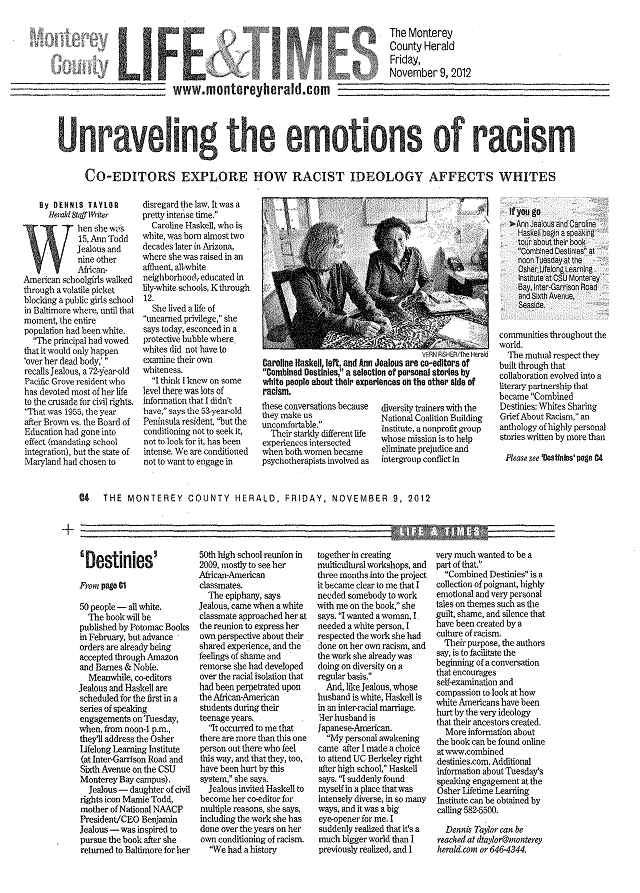Full Story follows image

As published on Monterey County Herald’s site:
Ann Todd Jealous, Caroline Haskell, speak on new book at CSU Monterey Bay
Co-editors explore how racist ideology affects whites
By DENNIS TAYLOR
Herald Staff Writer
Posted: 11/08/2012 06:05:20 PM PST
Updated: 11/09/2012 09:25:20 AM PST
When she was 15, Ann Todd Jealous and nine other African-American schoolgirls walked through a volatile picket blocking a public girls school in Baltimore where, until that moment, the entire population had been white.
“The principal had vowed that it would only happen ‘over her dead body,'” recalls Jealous, a 72-year-old Pacific Grove resident who has devoted most of her life to the crusade for civil rights. “That was 1955, the year after Brown vs. the Board of Education had gone into effect (mandating school integration), but the state of Maryland had chosen to disregard the law. It was a pretty intense time.”
Caroline Haskell, who is white, was born almost two decades later in Arizona, where she was raised in an affluent, all-white neighborhood, educated in lily-white schools, K through 12.
She lived a life of “unearned privilege,” she says today, esconced in a protective bubble where whites did not have to examine their own whiteness.
“I think I knew on some level there was lots of information that I didn’t have,” says the 53-year-old Peninsula resident, “but the conditioning not to seek it, not to look for it, has been intense. We are conditioned not to want to engage in these conversations because they make us uncomfortable.”
Their starkly different life experiences intersected when both women became psychotherapists involved as diversity trainers with the National Coalition Building Institute, a nonprofit group whose mission is to help eliminate prejudice and intergroup conflict in communities throughout the world.
The mutual respect they built through that collaboration evolved into a literary partnership that became “Combined Destinies: Whites Sharing Grief About Racism,” an anthology of highly personal stories written by more than 50 people — all white.
The book will be published by Potomac Books in February, but advance orders are already being accepted through Amazon and Barnes & Noble.
Meanwhile, co-editors Jealous and Haskell are scheduled for the first in a series of speaking engagements on Tuesday, when, from noon-1p.m., they’ll address the Osher Lifelong Learning Institute (at Inter-Garrison Road and Sixth Avenue on the CSU Monterey Bay campus).
Jealous — daughter of civil rights icon Mamie Todd, mother of National NAACP President/CEO Benjamin Jealous — was inspired to pursue the book after she returned to Baltimore for her 50th high school reunion in 2009, mostly to see her African-American classmates.
The epiphany, says Jealous, came when a white classmate approached her at the reunion to express her own perspective about their shared experience, and the feelings of shame and remorse she had developed over the racial isolation that had been perpetrated upon the African-American students during their teenage years.
“It occurred to me that there are more than this one person out there who feel this way, and that they, too, have been hurt by this system,” she says.
Jealous invited Haskell to become her co-editor for multiple reasons, she says, including the work she has done over the years on her own conditioning of racism.
“We had a history together in creating multicultural workshops, and three months into the project it became clear to me that I needed somebody to work with me on the book,” she says. “I wanted a woman, I needed a white person, I respected the work she had done on her own racism, and the work she already was doing on diversity on a regular basis.”
And, like Jealous, whose husband is white, Haskell is in an inter-racial marriage. Her husband is Japanese-American.
“My personal awakening came after I made a choice to attend UC Berkeley right after high school,” Haskell says. “I suddenly found myself in a place that was intensely diverse, in so many ways, and it was a big eye-opener for me. I suddenly realized that it’s a much bigger world than I previously realized, and I very much wanted to be a part of that.”
“Combined Destinies” is a collection of poignant, highly emotional and very personal tales on themes such as the guilt, shame, and silence that have been created by a culture of racism.
Their purpose, the authors say, is to facilitate the beginning of a conversation that encourages self-examination and compassion to look at how white Americans have been hurt by the very ideology that their ancestors created.
More information about the book can be found online at www.combineddestinies.com. Additional information about Tuesday’s speaking engagement at the Osher Lifetime Learning Institute can be obtained by calling 582-5500.
Dennis Taylor can be reached at dtaylor@montereyherald.com or 646-4344.